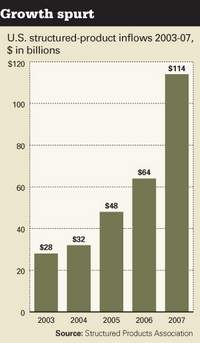By Aaron Hochman-Zimmerman
Prospect News Special Coverage
Structured Products Association Annual Conference 2008
For full coverage of SPA-2008 from Prospect News:
Click here for Day One (Wednesday, April 9, 2008)
Click here for Day Two (Thursday, April 10, 2008)
New York, April 10 – Moving into 2008 structured products issuers and dealers will have to ensure that clients are kept informed of what structured products can offer as well as deal with attacks from competitors, a panel said at the second day of the Structured Products Association summit.
Externally, the sector has come under fire by proponents of mutual funds who have put up a "very aggressive lobbying position" against exchange-traded notes (ETNs), which are not required to distribute income annually, said Adrienne Browning of Deutsche Bank.
Mutual funds are required to distribute earnings annually and are taxed accordingly. "In Congress right now, the fight is going on," said Ray Shirazi of Cadwalader, Wickersham & Taft LLP.
The Internal Revenue Service and the Treasury Department are currently accepting comments on ETNs and pre-paid forward contracts, Browning said.
Meanwhile, Rep. Richard Neal, D-Mass., who is "in the mutual fund district," according to Browning, has already introduced and is pushing HR 4912, which would require all ETNs to be taxed similarly to a mutual fund. "So that’s a big heads-up," Browning added.
‘Innumerable combinations’
Structured products must also contend with a supply chain that is unaware of the possibilities the products may offer or the pace of the new issue market. "Structured products really has arrived … Structured products has beaten closed-end funds in terms of size and issuance," said Eric Miller of HSBC.
"Investors do have a very good reason to look into structured products," he said, whether they want safety in terms of protection or FDIC insurance.
"As the baby boom generation ages, they will become more beta-phobic," said William Bamber of Bear Stearns, and a structured product could be engineered to suit that specific need.
"There’s almost innumerable combinations and permutations that we can dream up," he said.
Still, "education is what we all need to focus on before we can move to the next step," said Alexandre Ecot of Societe Generale.
Investors are becoming more sophisticated, Miller said.
Recently, "for the first time someone asked me what the CDS [credit default swap] is" for a structured product issuer, he said.
Many feel that "the Street has a better idea than the rating agencies" of an issuer’s credit, he said.
Favoring the simple
The panelists agreed that education is important, but creating products that are simple and transparent is important as well, said Stephanie Bosio of Calyon Securities. "Simple is beautiful," she said. Investors "tend to go for products that are all-in-one."
Success depends on innovation from issuer to wholesalers, brokers and investment manager, "the way it is in Europe and Asia. I actually believe there is not enough competition," she said, as it fosters innovation in a market that is far from saturated. "It all depends on us to make this U.S. market a big one," she added.
SPA president Keith Styrcula described the current credit crunch as a watershed event which may force investors to look away from traditional securities to more adaptive and flexible instruments going forward.
"We really have not come close to tapping the investor pool in this sort of market," HSBC’s Miller said.
Subscribe to:
Post Comments (Atom)



No comments:
Post a Comment